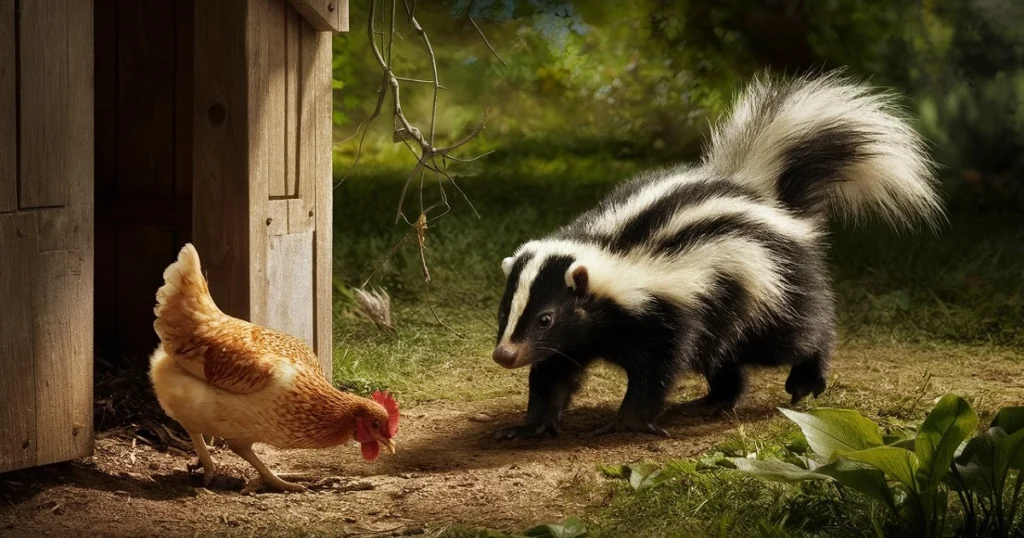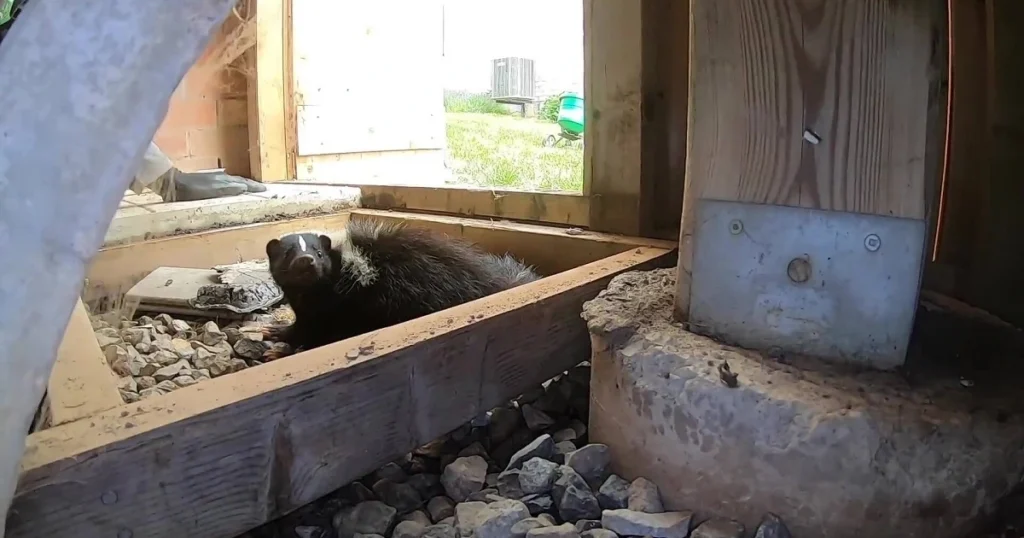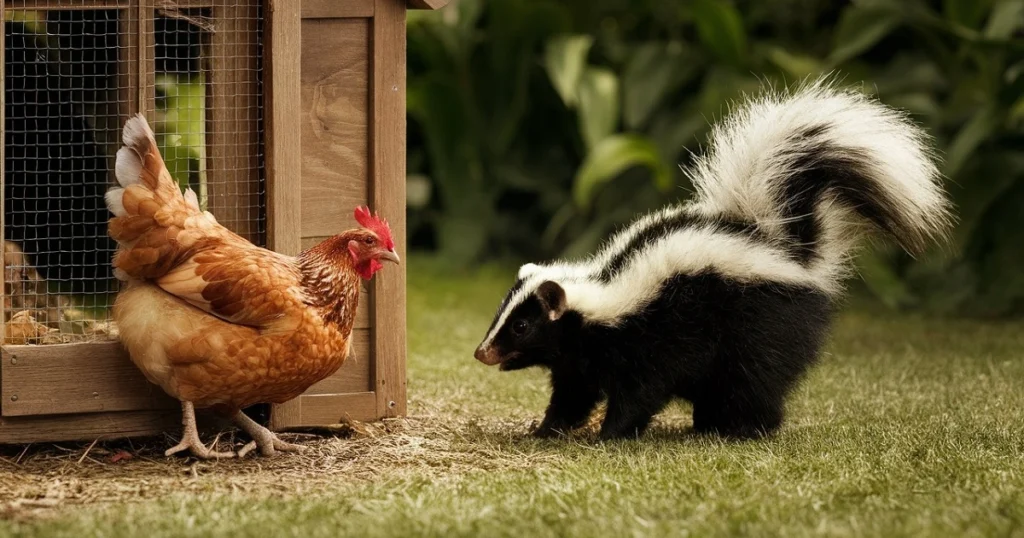
As backyard chicken farming gains popularity, understanding the potential threats to your flock is crucial. One common concern among poultry owners is whether skunks are dangerous to chickens. This comprehensive article will explore skunk behavior, their dietary habits, and practical measures to protect your chickens from potential skunk attacks.

Skunks are primarily nocturnal creatures, meaning they are active during the night and sleep during the day. This nocturnal behavior reduces the likelihood of daytime attacks on chickens, which are also less active at night. However, it is essential to understand that while skunks are not typically aggressive, they can become a threat under certain circumstances.
Skunks are omnivorous animals that eat insects, small mammals, fruits, and vegetation. They are opportunistic feeders, meaning they consume whatever readily available food is available. Skunks are known for their ability to dig and forage, often searching for grubs and insects in the soil. While skunks primarily hunt for smaller prey, they may occasionally target poultry, especially if food is scarce.
Skunks are notorious for their ability to squeeze through small openings. If your chicken coop is not adequately secured, skunks may find their way inside, posing a risk to your flock. Once inside, skunks are more likely to go after eggs rather than adult chickens. However, they may attack young or smaller birds if they perceive an opportunity.
To protect your chickens, it is crucial to recognize the signs of skunk activity around your property. Common indicators include:

Securing your coop is one of the most effective ways to protect your chickens from skunks. Here are some essential steps to take:
Skunks are attracted to food sources, so managing attractants around your property is crucial. Follow these guidelines to minimize the risk:
Installing fencing around your chicken coop and run can provide additional protection. Consider using electric fencing or burying a portion of the fence underground to prevent skunks from digging underneath. Regularly inspect the fencing for any damage or gaps that need repair.
Since skunks are nocturnal, installing motion-activated lights around the coop can deter them from approaching. Additionally, using noise-making devices such as radios or ultrasonic repellents can create a less appealing environment to skunks.
Encouraging the presence of natural skunk predators, such as owls and hawks, can help keep the skunk population in check. Providing nesting boxes for these birds of prey can attract them to your property, creating a natural deterrent for skunks.
Several natural and commercial repellents can help deter skunks from approaching your chicken coop. Here are some effective options:
Introducing guard animals to your property can provide additional protection for your chickens. Here are some options:
A clean environment is less attractive to skunks and other pests. Regularly maintaining and cleaning the area around your chicken coop can help reduce the risk of skunk encounters. Here are some tips:
Recognizing the signs of a skunk attack is important to take appropriate action. Common indicators include:

If a skunk has attacked your chickens, it is important to take immediate action to prevent further incidents. Here are some steps to follow:
In some cases, dealing with skunks may require professional assistance. If you cannot prevent skunk attacks or if the skunks pose a significant threat to your flock, call in the experts.
Critter Stop, a professional humane wildlife removal company, can provide effective solutions to manage and prevent skunk activity around your property.
With a fantastic reputation and excellent customer reviews, Critter Stop is known for delivering high-quality work and great customer service. They offer various services, including free inspections to assess and address wildlife or pest problems on your property. To get expert help, contact Critter Stop at (214) 234-2616 for a free inspection.
Protecting your chickens from skunks involves understanding skunk behavior, securing the coop, managing attractants, and using natural deterrents. By taking proactive measures and staying vigilant, you can significantly reduce the risk of skunk attacks and ensure the safety and well-being of your flock. For more detailed guidance and professional assistance, consult with a reputable pest control service like Critter Stop, which specializes in wildlife management.
Skunks are common in North Texas and can threaten backyard chickens. This FAQ addresses the most frequently asked questions about skunks and their potential danger to your flock.
Skunks are nocturnal; they may threaten your chickens if they get into a chicken coop at night. While skunks primarily target eggs and young chicks, they can attack adult chickens if they feel threatened or food is scarce. Securing your coop and ensuring no entry points can help prevent such incidents.
To determine if a skunk is killing chickens in your area, look for signs such as a strong, distinctive odor around the coop, burrowing or digging near the coop, and missing eggs or injured birds. Skunk tracks show five toes and claw marks, and droppings around the coop indicate skunk activity.
While skunks are not typically aggressive, they can defend themselves if threatened or cornered. A skunk can spray a dog with its pungent odor and, in rare cases, may bite. To prevent skunk encounters, it is important to supervise pets outside, especially at night.
To prevent skunks from killing chickens, take preventive measures such as securing the coop with hardware cloth, removing attractants like fallen fruit and spilled feed, and installing motion-activated lights around the coop. Additionally, consider using natural repellents like predator urine or pepper-based sprays to deter skunks from approaching the area.
Chickens free-ranging at night are at a higher risk of being attacked by skunks. Skunks are more likely to target free-ranging chickens if they are easily accessible. To protect your chickens, ensure they are safely secured in a coop or enclosed run before nightfall.
If skunks can access the coop, they are likely to kill chickens, especially young or smaller birds. Skunks are opportunistic feeders and will take advantage of any easy meal. Securing your coop and eliminating potential entry points can significantly reduce the risk of skunk attacks.
A skunk is less likely to kill a chicken locked in a secure coop. A well-constructed coop with no gaps or weak points will prevent skunks from gaining access. Regularly inspect and maintain your coop to ensure it remains secure and provides a safe environment for your chickens.
If a skunk finds food inside the coop, such as eggs or feed, the chances of a skunk attacking a chicken increase. Skunks are attracted to easy food sources, and once inside the coop, they may attack chickens, especially if they perceive them as a threat or competition for food. To minimize this risk, ensure that all food sources are properly stored and the coop is secure.
For professional assistance in managing and preventing skunk problems, contact Critter Stop at (214) 234-2616 for a free inspection. Critter Stop is renowned for its high-quality work and excellent customer service, ensuring your property is safe from wildlife threats.
Visit our Critter Library and learn more about our furry friends